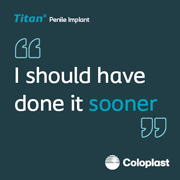Lalo6000 wrote:I joined this community in January 2023. After receiving my Coloplast Titan Implant in 2022, one thing has consistently troubled me: the questions I get about my satisfaction with the implant. Each time I visit my urologist, I am given simplistic questionnaires that ask if I am satisfied with my ability to have an erection sufficient for intercourse. And each time, I mark up the forms, commenting that the question is far too narrow to capture my real feelings.
You would think after repeatedly crossing out these questions, my doctor might stop and ask why. But no. He never does. If these types of surveys are the primary tools for measuring patient satisfaction, it is no wonder satisfaction rates are high. I answer "yes" to the basic question because it is the only one, I am given and, technically, it is true. I can pump it up and have an erection whenever I need one. But that is just scratching the surface.
I do not blame my doctor personally for this, but it speaks of a larger issue in how society and the healthcare system view men's sexual health. In my experience, urologists often approach men with a simplistic mindset: "Get him hard again, and he’ll be happy." They cannot restore natural erections, but they can offer a prosthesis that mimics one.
However, this level of satisfaction would not be expected for any other kind of prosthesis—whether it is for a nose, an ear, a hand, or a foot. Research bears this out. There is nowhere near the same satisfaction rates for those prostheses as there are for penile implants. This raises concerns about the design of these satisfaction surveys. Men are human beings with complex feelings, and it seems perfectly natural to feel conflicted about needing a prosthesis for such an intimate function. But when it comes to penile implants, there seems to be an unrealistic expectation that we will all be thrilled with the result.
What really struck me recently was an article in the Oxford Academic Journal titled Managing the Difficult Penile Prosthesis Patient. It explained that the small percentage of patients who are dissatisfied despite “acceptable surgical results” are often labeled with the acronym CURSED—standing for Compulsive/obsessive, Unrealistic, Revision, Surgeon Shopping, Entitled, Denial, and Psychiatric. When I read this, I thought, "Wow, talk about shaming patients into silence." Who would feel comfortable being honest about their dissatisfaction if doing so risks being dismissed as "CURSED"?
This reminds me of something Nietzsche said about group criticism—he called it a manifestation of the "herd mentality." In this view, people conform to common values and suppress those who deviate from the norm, not to promote individual growth but to maintain mediocrity and safety. Some men may have a perfectly reasonable psychological and emotional reaction to a prosthesis, but their concerns are often sidelined.
I have been reading posts here for a while now, and I am constantly impressed by the courage many of you show in sharing your stories, both of success and vulnerability. However, I have also noticed (though not always—there are many empathetic members here) that when someone expresses dissatisfaction, they are sometimes told, “Be happy you can still have an erection,” as if that alone should soothe us. We know we are much more complicated than that.
In my own experience, I went through what I believe is the typical path for a 48-year-old prostate cancer patient at the time: normal sexual function, followed by a radical prostatectomy, which led to erectile dysfunction. I tried ED pills and injections, but eventually, neither worked. After a period of complete impotence, I chose to get a penile implant. Alongside this physical journey were significant challenges in my personal life—relationship struggles and breakups linked to erectile dysfunction, as well as battles with depression, anxiety, therapy, and sexual counseling. I'm still standing, but not without physical and emotional scars, along with lingering reservations.
It's a mixed experience for me. Some days, I’m thrilled that I can enjoy penetrative sex again. I work out 3 to 5 days a week, my endurance is great, and I can engage in long sessions without getting winded. On those days, I feel good about the functionality. But other days, I really dislike the way my penis looks. It has an odd, flat, oval shape, with an indentation running down the middle of the shaft that makes the tubing on both sides more noticeable. There's little to no blood flow, no natural tumescence, and the head of my penis remains small and doesn’t engorge. I use gels, vacuum erection pumps, and rings to trap blood, but honestly, it often ends up being painful. Many times, I have sex while dealing with discomfort or pain, which only adds to the frustration. After seeing multiple doctors, all of them have basically told me, “It is what it is,” and there’s not much more they can do.
Then there's the issue of anorgasmia. My sensitivity has decreased to the point where achieving orgasm has become incredibly rare. I’ve tried medications without success. I don’t take anything that would interfere with my ability to orgasm, but no matter how much I pump or attempt manual stimulation, I’m lucky if I can orgasm 1 out of 10-15 times. Whether it’s through intercourse or other forms of stimulation, it’s just not happening. I’ve seen excellent sex therapists and tried all kinds of approaches, but this is where I am now.
So, to put it plainly: Yes, I’m glad I got the implant. Yes, I love that I can have intercourse again and no longer have to worry about impotence. But at the same time, I struggle with accepting the prosthesis. I have issues with my body image, with how my penis looks, with depression and anxiety, and with the frustration of not being able to release my sexual energy through orgasm. I understand that sex is about more than just orgasms—it’s also about intimacy—and I show up for that. I don’t shy away from life, relationships, or sex.
I’m sharing this to emphasize that it’s complicated. We all know that. It doesn’t have to be all sunshine and rainbows, nor does it have to be darkness and gloom. For me, sometimes it’s both, and sometimes it’s neither. There are days when I don’t even think about it. And there are some days it's all I can think about. But I’ll admit, since prostate cancer, I think about my penis way more than I used to.
I want to encourage other men to be open, honest, and vulnerable about their low points, if they have them, without feeling labeled or CURSED. I’ve found that the high moments can balance out the lows, and making space for both feels like the most human thing to do.
Men's experiences with penile implants are multifaceted, and it's time the healthcare system acknowledges the emotional and psychological complexities that come with this journey. It is not just about functionality; it is about feeling heard and understood.
Thanks for Reading
Peace
I think there are a few different groups and likely the different groups have different opinions about the surgery and satisfaction.
The first would be "long term normal function, decline in function, and eventual (or impending) inability to function" group. They likely can naturally still orgasm.
The second group would be the "significant event caused immediate impaired function." They may or may not be able to orgasm.
The third group would be "lifelong ED." They may or may not be able to orgasm.
I fall in the first group-- there is a seriously damaging psychological effect to the decline... and after a decade of struggles and eventual barely able to be used 1 in 10 times... I can't even tell you how traumatic it was for me to orgasm with a limp dick (or fail to because I couldn't stimulate it enough) because I couldn't stay hard long enough to penetrate no matter how horny i was, no matter how badly i wanted it, no matter the dosage of pills or meds taken (like at the end I took *multiple* ed meds concurrently at doses I wouldn't recommend to anyone ever for safety reasons, but I was *that* desperate.) I am beyond thrilled with my implant. In fact above and beyond that, it eliminated all my original sexual anxiety, I don't lose my erection until *I'm* ready to. Even given the choice between this and the penis I had at my prime (which functioned very well), I would 100/100 times choose the implant knowing what I know now. I imagine a LOT of people in this group are really happy with the implant, at least at the level of "wish I'd have done it earlier even if its not entirely my natural penis." and if the only problem you had was getting erect, and you can still orgasm, absolute control over your erection, what's not to love (other than surgical risks)?
The third group has no real baseline to what it *should* function like or it's been so long it's memory is dim, so I imagine satisfaction is fairly high, they can function and they have no solid baseline to compare to... at a minimum its a psychological relief, and If they can orgasm, they're probably thrilled, if they can't at least it's closer to normal and enough to keep them from being self-conscious when with other people.
The second group in my opinion likely makes up most of the dissatisfied/CURSED (which is really an unfair term) people. In some cases there is a loss of ability to orgasm... this alone is devastating if you could prior. They have a solid base line to compare to, maybe recently, so every failing is glaringly obvious where it's dimmed for those losing function for years or never existed for lifelong ed sufferers... and it's so easy to compare yesterday to today. They don't have the *years* of disappointment, anxiety, and societal judgement that someone in the first and second group is relieved from. They may or may not have come to terms with everything involved in whatever resulted in their ED in the first place... and that makes it all the harder to accept the implant and loss of function.
I guess there would be a fourth group as well, those with complications... and those could happen to any of the prior groups and I think it's highly likely they're not real thrilled in many cases.
YMMV, I'm sorry you're struggling with body image issues and you're not happy with how the implant has panned out for you and especially the lack of orgasms, that's a raw deal, frustrating. There is a lot of psychology questionnaires that don't offer enough granularity and this is a good example of one, another is the depression/anxiety surveys... options are (weekly) "never", "several days", "most days", "everyday"... I have went from a 3-4 day average frequency on the one to a 1 day a week frequency... but that is still more than never. So my survey value there is always 1 and my psych doctor says "oh no improvement" and it's like "no, pretty significant improvement, about reduction of 75%... but ok :/"
Hopefully the day comes when you can get your natural function (use and orgasm) back through new therapies... for me, long as this thing keeps working, I'm happy having it... if it fails, I'll replace it. I would take it over my natural 100% of the time.
46yo, Venous Leak, Diabetic, ED 2016, VED/Cialis 2021, Needle phobia. 20cm Titan implant w/3.5cm RTE (pump location) 03/02/23 by Dr Aram Loeb (HVS) at University Hospital, Ohio. PED 7"x5.5", PO 6"x5.5", CS 7.5"x5.5".








